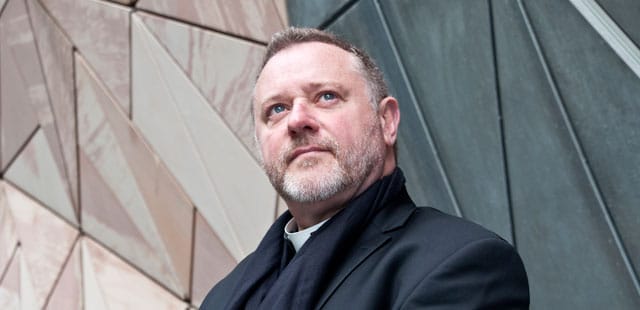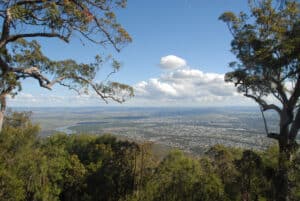A conversation with Gosford Anglican Church’s Fr Rod Bower

1 October 2018
Perhaps one of the most recognisable clergy in the country, at least to a secular audience, Gosford Anglican Church’s Father Rod Bower has made a name for himself speaking out on several divisive social justice issues. With the release of his new autobiography Outspoken, Chris Shearer spoke with Fr Bower about what’s it like for a self-confessed introvert to enter the fray of national public debate.
TMA: While there are strong autobiographical elements to it, Outspoken is not a typical autobiography. What do you see as the book’s purpose?
Fr Rod Bower: I think I’ve discovered that in hindsight, rather than sitting down to write a book for a purpose. I’ve come to understand that the book is about the dance between order and justice. It’s something that the Church has not danced well. I think that’s certainly what we saw in the Royal Commission, that the Royal Commission ultimately was exposing the Church’s absolute commitment to what it saw as order, and a very faltering and sometimes non-existent commitment to justice.
You’ve said in the book that the Church is at its best when its doors are open in civic engagement, when it’s broad enough for people from all walks of life. Do you think the Anglican Church was damaged by the very public division between conservatives and progressives on show during the SSM postal survey?
There’s always been division in the Anglican Church. In the old days it was the theological and liturgical divisions of the old fashioned high church and low church stuff. Those days are thankfully gone, but they have I think been replaced by a division between conservative and progressive, which I still read as that basic issue of order and justice. I think the book is an attempt to explore that dynamic not only on a personal and ecclesiastical basis, but also on a national basis. We’re seeing this dynamic in the asylum seeker-refugee debate. It is really a debate between order and justice. A healthy person, group, or society has both of those things in tension. When one dominates the other you either have tyranny or anarchy. But a healthy society has them together and a healthy church has them together. This is the debate for our Church. Well, it’s really the debate we are having but not having very well.
Is there a way to better encourage that debate? There seems a reluctance to engage with the other side.
There was a really good article recently by Robert Manne exploring this dynamic in terms of the asylum seeker debate, where everyone has gone to their corners and are not prepared to come out. The progressives are taking the moral high ground and the conservatives are taking that sort of political law and order ground and neither are prepared to give an inch. I think Robert Manne was right: I think both are forgetting what this is about. It’s about people dying. I think the same can go for the Church. We take our particular conservative or progressive platform and go into our corners and refuse to come out. When we do that we actually forget what we’re here for, and that is to live the kingdom of God. One of the most obvious ways of living that is by learning how to live with someone that you may disagree with or hold a different view to. It’s when we can do that that we can actually show the world something: that there is hope in the Christian Gospel.
The people who are going to lead the charge on these issues in the future, they’ve seen these great society-wide schisms on refugees, terrorism, LGBTIQ rights as they’ve grown up. What are some of the lessons people should take away from the last two decades in Australian society, where these great rifts around refugees, national security, LGBTIQ rights, and others have occurred so easily?
365 times in the Scriptures, the term ‘do not be afraid’ is used. I’m sure that’s totally coincidental, but it’s kind of nice to have it once for every day of the year. I think the lesson that we should take from this era is don’t be afraid. Don’t let fear make decisions for you. Because fear reduces your options. For us, on the refugee issue, the use of fear in the political world reduced our options to spending billions in incarcerating a couple of thousand people. When you look at it like that, you think ‘what would we have done with those billions had we not been afraid?’.
When that doesn’t happen, you need prophetic voices. The three hallmarks of the Hebrew prophetic tradition are you have to be absolutely clear about what you’re saying, you have to be prepared to live on the outskirts of your society or your organisation, and you have to at times be willing to be outrageous. That’s the voice that speaks into and highlights the situation. It’s not the voice that actually provides the answers. That’s a different group of people, a different voice. But until the situation has been highlighted and it’s in people’s consciousness, then people can’t come together to find a way forward.
In terms of getting that voice out, social media is something which you’ve deployed very well to that effect. When you put up that first sign – DEAR CHRISTIANS, SOME PPL ARE GAY. GET OVER IT. LOVE GOD – and then posted the image to Facebook, did you expect it to take off like it did?
No. I didn’t even have that concept that that was even possible. We had 150 likes on our Facebook page. I would never imagined that that would be, could be, any different until I put up that first sign and within a few days we’d gone to 1000 likes and within a week we’d gone to 3000. Then I realised that there’s a possibility of a bigger platform to talk to people.
As an unplanned entrance onto the national, even world, stage, I would almost look at that and go ‘what have I done?’.
We did. When you have no media training or expertise it can be really quite unsettling. It was for me, for quite a while. Occasionally, when something hits and all of a sudden you’re doing breakfast radio for a week and waking up at five o’clock every day, it really is exhausting. Especially for someone as chronically introverted as I am. I get accused by my less sympathetic commentators as being an attention seeker. I’m anything but. Honestly, if I could go into my study and shut the door, just be immersed in my books, I’d be quite happy.
Social media has given anyone the opportunity to speak to a wider audience, but that said, it can also give people a chance to share toxic ideas or easily attack others. How useful do you think it is to be outspoken on these platforms as a way to speak into public debate?
You are correct that social media can be very toxic, and we experience that. Thousands of very toxic comments and even death threats come by us by social media. So for me it’s a matter of not leaving social media to the toxicity alone, but trying to put some other voices in there as well. And occasionally you get lovely things. Like I had just the other day a gay man who had felt really the strong call of the Spirit to faith but was afraid of judgement by the Christian community. I’ve never met this person and I probably never will, but he sent me a message to say that because he had seen time and time again positive messages on social media from us, he was actually brave enough to approach an Anglican church in Victoria, was baptised, and sent me a lovely note the other day to say he was confirmed. I just think, that alone, that made it all worth it. But it’s not the only one of course.
There’s also been some pretty frightening consequences, like the invasion of one of your Sunday services by far-right activists last year. Do you still have that fear when you go to put something new up there?
Yes. I have a level of anxiety on a Sunday morning. We are conscious of our security and we take measures to ensure those things don’t happen again. But my question is, if you’re turning up on a Sunday morning to church and there is no pushback from the world, then you’re not doing it right [laughs]. There has to be an element of that in being a Jesus-shaped Church.
One of the things I’ve noticed from the book is you have a very good way of drawing on moments from your life that are formative – things you can identify and look back on and say ‘that changed me’. How important are those moments of self-realisation/self reflection?
I think it’s essential, otherwise we keep making the same mistakes over and over again. I value very much the Ignation spiritual tradition, which has a strong element of examining your life, and examining it in the light of the great story, and in particular in the light of the life Jesus. And so, when we do that we grow, we develop, we learn, we try not to make the same mistakes again. Ultimately for the reader it’s not about my story, it’s about their own story. It’s about that moment as they read my story, when something is ignited in theirs and they go away and think about that.
You are shaped by your past but you’re not chained by it in any means. Because, again, that’s one of the great hopes offered by the Gospel, because it’s a Gospel of being born again. So we all have that, that’s available to us all again and again and again. We can’t do that until we have examined our story, our life.
Why should people buy the book?
I think what people will gain from the book is a deeper consciousness of that tension in their own lives between order and justice, and that tension in their own communities, and our own nation. It’s bringing that into our own consciousness that we are then able to make better decisions. That’s what they’ll get. I think one of the other things I hope is that in particular Christian readers will take from this is a renewed consciousness and passion for the marginalised, whether that be the LGBTI community, or refugees, or the homeless, or people living in situations of domestic violence, whatever. That we are best as our Church when we are standing strong in that area, so I think that’s very important.
This conversation have been edited for brevity.
Fr Bower’s book, Outspoken, is available in bookstores and online at https://www.penguin.com.au/books/outspoken-9780143788409






